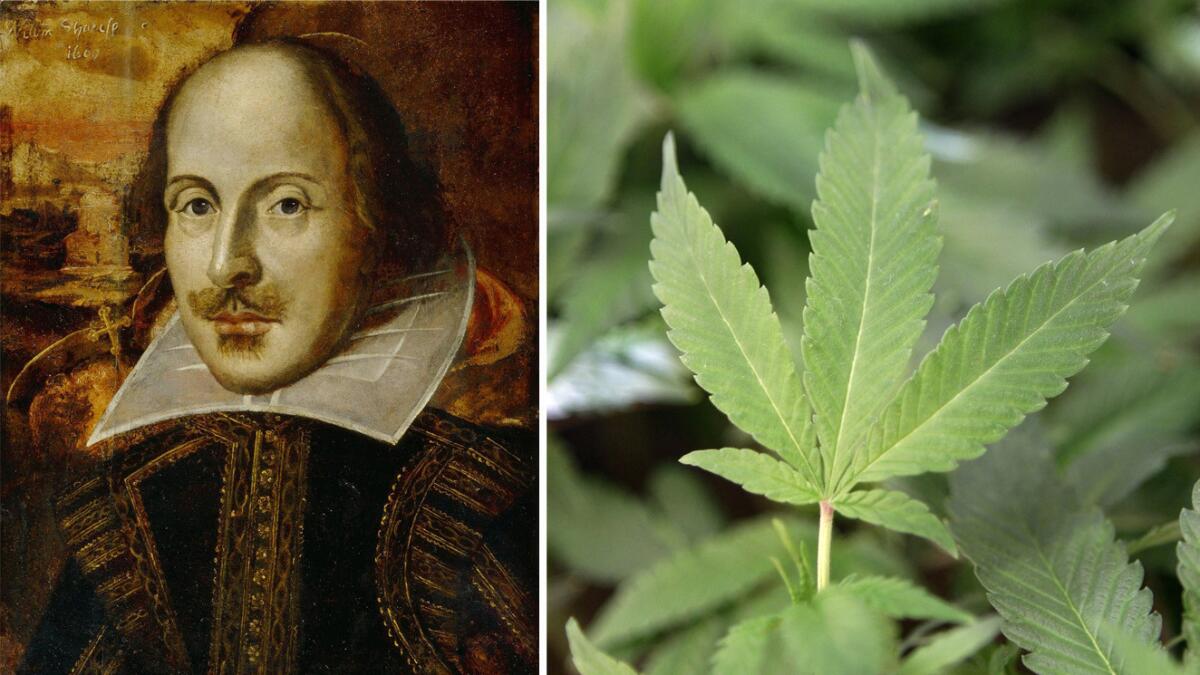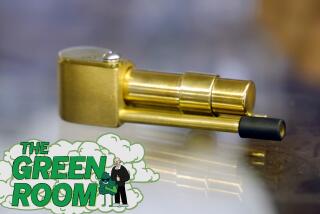To inhale or not to inhale: Was Shakespeare a cannabis user?

A recently published paper on Shakespeare and his smoking habits suggests that the Bard may used cannabis.
- Share via
In “Romeo and Juliet,” the lovelorn hero proclaims in Act One that “Love is a smoke raised with the fume of sighs.”
The line may have actually been inspired by the fumes of cannabis, according to a recently published paper on Shakespeare and his smoking habits.
The report, which cites a 2001 analysis of early 17th century pipes from Stratford-upon-Avon and the Bard’s own residence, argues that Shakespeare could have smoked the substance and was probably well aware of its hallucinatory effects.
In some cases, the pipes contained evidence of cocaine, though it remains unclear if Shakespeare himself ingested the substance.
SIGN UP for the free Essential Arts & Culture newsletter >>
Though the new paper is based on a 2001 study, it advances the argument by citing possible references to drugs in the writings of Shakespeare. The paper also states that Shakespearean scholars were critical of the original study and urges them to reconsider the evidence.
“Literary analyses and chemical science can be mutually beneficial, bringing the arts and the sciences together in an effort to better understand Shakespeare and his contemporaries,” wrote Francis Thackeray, the author of the paper who was also involved with the original study. He teaches in the Evolutionary Studies Institute at the University of the Witwatersrand in Johannesburg, South Africa.
For the original study, researchers were loaned pipe bowls and stems from the Shakespeare Birthplace Trust in Stratford-upon-Avon, which has several of the pipes excavated from the garden of Shakespeare.
Using gas chromatography mass spectrometry, a procedure common in forensic testing, researchers found evidence of cannabis in eight samples, nicotine from tobacco leaves in at least one sample, and “definite evidence” for Peruvian cocaine from coca leaves in two samples.
Neither of the two pipes came from the garden of Shakespeare, according to the study. But four of the pipes with cannabis did.
The study cited Shakespearean writing that contains references to what could be interpreted as drugs. For instance, the Bard’s Sonnet No. 76 features references to “compounds strange” and “a noted weed.”
Thackeray wrote in the new paper that “Shakespeare may have been aware of the deleterious effects of cocaine as a strange compound,” though it’s possible that the Bard “preferred cannabis as a stimulant.”
Twitter: @DavidNgLAT
MORE:
Why, and how, we should read Shakespeare today
Study finds a disputed Shakespeare play bears the master’s mark
Was Shakespeare a stoner? Scientist finds marijuana residue in playwright’s pipes
More to Read
The biggest entertainment stories
Get our big stories about Hollywood, film, television, music, arts, culture and more right in your inbox as soon as they publish.
You may occasionally receive promotional content from the Los Angeles Times.











